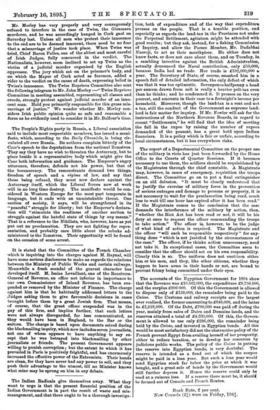The report of a Departmental Committee on the proper use
of the military in riots has just been forwarded by the Home Office to the Courts of Quarter Sessions. If it becomes necessary to use them, the soldiers should be requisitioned by the Magistrates through the chief constable. A Magistrate may, however, in cases of emergency, requisition the troops direct. The Committee go on to put a final extinguisher on an old delusion. "It must be clearly understood that to justify the exercise of military force in the prevention of serious outrages and damage to persons or property, it is not necessary to wait for the proclamation being read, much less to wait till one hour has expired after it has been read." If the Magistrate comes to the conclusion that the case demands the interference of the military by action, then, "whether the Riot Act has been read or not, it will be his duty at once to request the officer commanding the troops to take action." The officer is, however, to be the judge of what kind of action is required. The Magistrate and the officer "will each be responsible respectively" for any- thing done "which is not justified by the circumstances of the case." The officer, if he thinks action unnecessary, need not take it. In exceptional cases, the Committee seem to consider that the officer should act on his own responsibility. Clearly this is so. The uniform does not uncitizen either him or his men, and they, like other citizens, whether they happen to have arms in their hands or not, are bound to prevent felony being committed under their eyes.


































 Previous page
Previous page